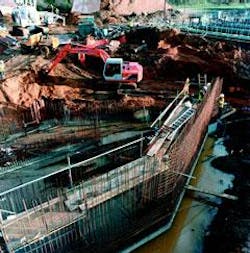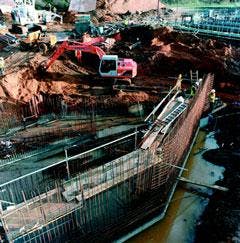Mogden sewage treatment works upgrade program nears completion
By Christopher French
More than US$ 85 million worth of improvements to the Thames Water Mogden Sewage Treatment Works in West London, England, will be completed by the end of 2002 by a project team comprised of engineers from Black & Veatch (International), Paterson Candy Limited, Binnie Black & Veatch and Thames Water. The Mogden sewage treatment works serves a huge catchment area of 1.8 million people.
Originally built in the 1930s, the Mogden works required major upgrades to comply with the European Union Urban Wastewater Treatment Directive and the Sludge Directive. Thames Water awarded Black & Veatch, the parent company of Paterson Candy, a US$ 57-million contract in 1996 to improve and extend the Mogden wastewater works at Isleworth.
The enormous scale of work on the 120-acre site led the companies involved to create an onsite establishment for the project team to work closely alongside each other. This partnership alliance brought together consultant design engineers; Paterson Candy, which handles commissioning and construction personnel; and construction, commercial and procurement services drawn from the four companies represented on the project team.
During the five-year improvement program, the Mogden Project Team managed more than 160 sub-contractors, ranging from installers to equipment suppliers, from site security to major turnkey plant manufacturers and from cleaning activities to off-site waste disposal. The close working relationship with specialist sub-contractors ensured that design concepts have been strictly adhered to and that construction and installation meet all safety standards. The Royal Society for the Prevention of Accidents (ROSPA, UK) awarded the team three awards for occupational safety from 1999 to 2001- two gold and one silver.
The team approach of integrated working reduced plant commissioning time by 30% and caused minimal disruption to the works operation. According to Jagtar Chonkaria, Paterson Candy's Lead Commissioning Engineer at Mogden, "Working side by side has consistently nipped any potential problems in the bud. Avoiding complications allowed us all to concentrate on maintaining very high standards, and at the same time generate a genuinely joint determination to drive down costs."
The Mogden Team's first assignment in 1996 was the US$ 9.4-million East Side Inlet Works Refurbishment Contract. This facility processes some 500 million litres of wastewater per day.
In 1998, Thames Water awarded a US$ 46-million West Side Works Extension to the Mogden Project Team. The extension, which was built and commissioned in two stages, incorporated civil construction works, earth works and landscaping. While the construction and commissioning of Stage 2 of the West works was taking place, a temporary pipeline was installed over ground to take the flow from the new PSTs to the exiting "old" aeration lanes in order to keep the new stream operating in parallel with the existing works.
For the past two years, Paterson Candy personnel forming a part of the Mogden Project Team are working on a US$ 33.4-million Digester Refurbishment and Sludge Stream Improvement Project, which is due for completion by the end of 2002. The largest component is the upgrade of 16 digesters to meet a 12-day retention time at an operating temperature of 32°C- 38°C. The digesters were taken out of service sequentially in groups of four before construction and installation, then re-commissioned into service using an innovative seeding process devised by the team.
This method modified existing pipelines and re-routed digested sludge from in-service digesters using existing transfer pumps. This process reduced the normal seeding time required to bring a digester into service from 28 days to 3 days. The project scope included project management, safety management, design, installation and commissioning of:
• upgrade digester feed pumps in pumping station No. 5
• replacement roofs on three digesters
• sludge heating for each refurbished digester
• 3 mW dual fuel in-line heating boiler system for heating feed sludge to the digesters
• installation of a supply from the gas generated by the digester and feed to the inline sludge heating boiler.
Author's note
Christopher French is a public relations consultant based in Solihull, West Midlands, England.


